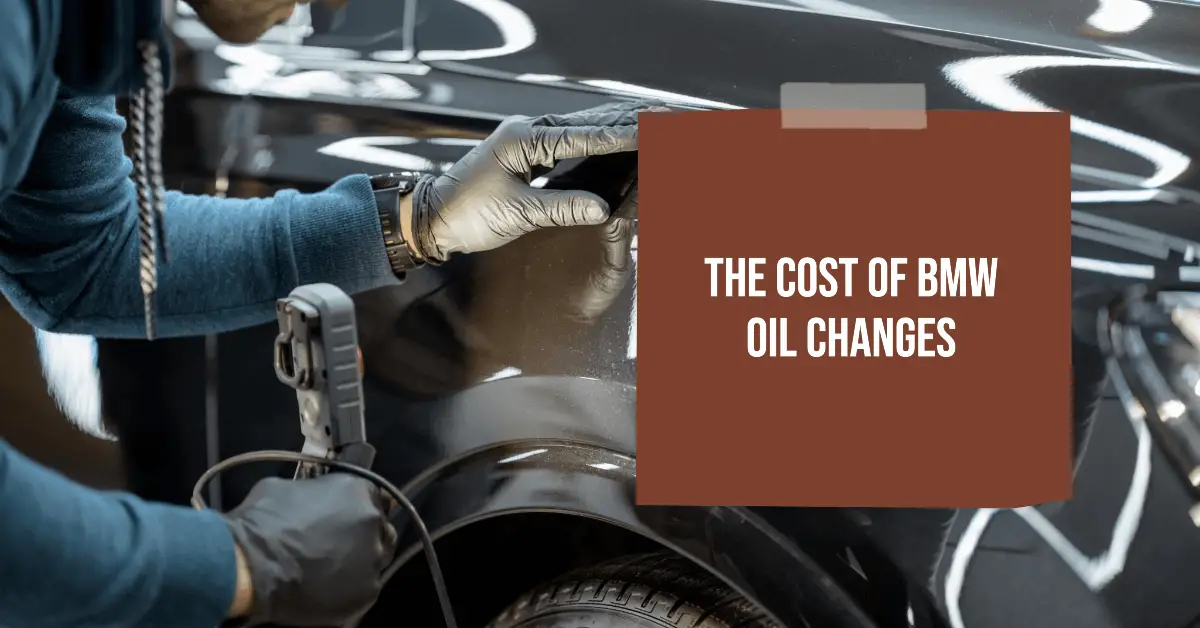Why Are BMW Oil Changes So Expensive? An Explanation
Owning a BMW comes with an air of luxury, performance, and prestige. However, maintaining these ultimate driving machines also comes at a premium cost – especially when it comes to routine maintenance like oil changes. BMW oil changes typically run $150-$300, nearly 2-4 times more expensive than a standard oil change on other vehicles.
So why exactly are BMW oil changes so costly, and is there anything drivers can do to reduce expenses while still properly maintaining their car? In this detailed article, we’ll explore the specific reasons behind the high BMW oil change costs and provide tips to save money without compromising quality.
Introduction to BMW Oil Change Costs
First, let’s start by looking at why BMW oil changes are substantially more expensive than other vehicle brands. There are a few core reasons:
BMW Engines Require Specialized Synthetic Oils and Parts
BMW engines are precision-engineered for high performance and built to tight tolerances. To meet BMW’s specifications and keep the engine running in peak condition, full synthetic motor oils must be used.
Synthetic oils outperform conventional oils in key areas like:
- Keeping the engine cooler under high loads
- Maintaining viscosity and flow at extreme temperatures
- Preventing sludge and harmful deposit build-up
The advanced additive packages in synthetic oil also provide enhanced protection against wear, oxidation, and oil breakdown over long drain intervals.
While beneficial, synthetic oils cost 3-5 times more per quart than conventional oils made from refined crude oil. Some BMW engines can require 6 liters or more of oil per change, so this adds up quickly!
In addition to the oil itself, BMW relies on premium oil filters specifically designed for its engines. These OEM filters have special designs and materials to capture more microscopic contaminants that can accelerate wear.
Using lower quality aftermarket oil and filters could severely impact engine performance. It could also potentially void your BMW warranty coverage.
Complex BMW Engine Designs Require Special Care
Many BMW performance engines feature complex designs that must be handled with greater care during oil changes compared to more basic engine layouts.
Some examples include:
- Double overhead camshaft (DOHC) configurations – This more advanced design has intake and exhaust camshafts located in the cylinder head to precisely control valve timing. The tighter spaces make removing covers and accessing fill points more challenging.
- Turbochargers – Found on several BMW models, these force extra compressed air into the engine for added power. The hot, fast-moving parts need ample splash lubrication from clean oil. Used oil must be vacuumed out from small crevices.
- High compression ratios – Squeezing the air/fuel mixture into a smaller space heightens the combustion force. This also raises pressures and temperatures inside the engine that oil must withstand.
While these innovations enhance BMW driving dynamics, they require technicians take additional time and care servicing the complex oiling systems. The specialized labor increases oil change costs.
BMW Dealership Parts and Labor Rates Are Higher
One surefire way to pay more for a BMW oil change is to take it to the authorized BMW dealership service center.
Dealers charge a premium for BMW genuine OEM parts and use only factory-trained technicians to complete the work. This combination of high-end supplies and specialized labor significantly bumps costs.
Depending on the BMW model and dealership location, an oil change can easily exceed $200+ just for basic parts and labor. Any required items like a new oil filter housing gasket or drain plug washer will be marked up even further.
While dealerships follow strict procedures and use top-shelf products, their overhead costs get passed onto customers in the form of inflated oil change prices.
Newer BMW Models Tend to Cost More for Service
Over the evolution of BMW vehicles from the early 1900s until today, oils have improved, engines have become more sophisticated, and service costs have risen.
Newer BMW models generally have a higher oil change cost than an equivalent older model. Some reasons include:
- Larger oil sump capacities – More quarts of synthetic oil required
- Increasing labor rates – Inflation over decades makes hourly shop rates go up
- More advanced engines – New tech like turbos and injection systems add complexity
- ** sensor systems** – Resetting and recalibrating the electronic service indicators after an oil change takes more time
So owners of brand new BMWs shouldn’t expect cheap oil changes, even at independent shops. The costs associated with properly maintaining factory-fresh engines using OEM-grade fluids and filters have increased over BMW’s 100+ year history.
Tips to Save Money on BMW Oil Changes
Now that we’ve explored the core reasons BMW oil changes cost so much, let’s go over some proven ways to knock down the price without sacrificing quality:
1. Use a Reputable Independent BMW Specialist
The best way to save big on BMW oil changes is having them performed at independent BMW repair shops instead of the dealer.
Independent specialists can offer hourly labor rates 50-75% cheaper than BMW dealerships. Their wholesale parts costs are also much lower for items like oil filters and gaskets.
However, to safely save, it’s extremely important to find an experienced independent shop that specializes in BMW maintenance and knows the intricacies of your model’s oiling system. Check reviews and ask around BMW owner communities for top recommended shops in your area.
Once you find a few candidates, call and ask some qualifying questions like:
- Do you use original BMW OEM parts or OEM-equivalent for oil filters, drain plugs, etc?
- Do you exclusively use the recommended full synthetic oils?
- Are your BMW-certified technicians trained on the latest service procedures?
Reputable independents will have no problem answering “yes” and giving you confidence they’ll properly care for your BMW. The cost savings of 50% or more versus the dealership will quickly add up, especially for repeat visits.
2. Extend Drain Intervals Using BMW’s Oil Service Indicator
Today’s BMW models use an electronic oil service indicator that monitors engine conditions and driving habits to determine when an oil change is truly needed.
This dynamic system accounts for factors like:
- Engine temperature extremes
- RPM ranges
- Short trips vs highway driving
Based on the cumulative engine load, it can dynamically determine the ideal oil change interval anywhere from 10,000 to 15,000 miles for most models.
By relying on BMW’s oil service indicator system instead of the outdated corporate-branded marketing of “Every 3 months or 3,000 miles”, most owners can safely extend drain intervals.
This allows you to reduce total oil changes per year by 50-75%. Combined with an independent shop’s lower labor and parts prices, you save big on maintenance costs.
Important note: Despite what quick lube chains want you to believe, modern synthetic oils do not simply break down based on months or mileage alone. The BMW service indicator tracks actual conditions to determine ideal change frequency.
3. Perform Oil Changes Yourself
For the hands-on BMW owner who doesn’t mind some extra effort, you can take oil changes into your own hands and save the most money. With some basic tools and supplies, you can cut oil change costs in half or greater compared to shops.
Be sure to use the proper OEM oil filter and certified synthetic oil in the recommended viscosity grade for your model. The extra few dollars spent here is far less expensive than an engine failure down the road.
You’ll also want a good quality extractor to vacuum used oil out of the tight BMW engine spaces and a container to catch oil. Be sure to dispose of the used oil at an approved recycling center as well.
While not for everyone, DIY oil changes on BMWs unlock massive savings versus overpriced dealers. And you get the satisfaction of taking care of your ultimate driving machine with your own two hands.
4. Ask Shops About Applicable Discounts
When calling around to quote BMW oil change prices, be sure to ask each shop if they offer any specials or ways to save money as a repeat customer.
Many independent shops will have periodic discount coupons or loyalty rewards programs to encourage customer retention. They may knocking 10% off or give free wiper blades after a certain amount of visits.
Often shops will bundle in a complimentary multi-point inspection with an oil change for a small upcharge. This allows them to spot any potential issues early before they become expensive repairs.
It never hurts to politely ask about any potential discounts when you call for quotes. Saving an extra $20-30 each visit adds up considerably over time.
The Value of Regular BMW Oil Changes
Beyond the costs savings tips outlined above, it’s important to keep in mind the core value provided by regularly scheduled BMW oil changes:
Prevents Costly Engine Damage
Clean oil reduces friction and provides vital cooling inside BMW performance engines. This keeps intricate components like turbo bearings, timing chains, and cylinder walls protected from premature wear and scoring.
Small particulates in dirty oil act like sandpaper as they circulate through tight tolerances within the engine. This gradually degrades surfaces. Fresh oil removes these contaminants.
Letting oil intervals lapse too long risks permanently damaging expensive BMW engine internals requiring extensive repairs. Proper changes prevent this.
Removes Sludge Buildup
In addition to suspended particles, used oil accumulates acidic compounds, water, unburnt fuel remnants, and thick sludge over time and miles.
This harmful sludge sticks to engine parts when the car sits. At best, it blocks oil channels and restricts flow. At worst, it bakes into a cement-like layer over critical components like pistons and camshaft journals.
Regular oil changes every 10,000+ miles flush out sludge before it causes serious issues in BMW engines.
Replenishes Additive Packages
Even the finest synthetic oils still deplete their additive packages as the miles accumulate. Important ingredients like anti-wear agents, detergents, corrosion inhibitors, and friction modifiers get used up.
A fresh oil change re-establishes the oil’s protection and cleaning abilities. Additives play a vital role in BMW’s long 10,000+ mile service intervals between changes. Using worn out oil past its prime invites disaster.
Uncovers Other Issues During Inspection
Lastly, don’t undervalue the importance of having a trained technician inspect your BMW during an oil change service. They’ll check for:
- External oil leaks from gaskets, seals, and plugs
- Damaged components like belts and hoses
- Abnormal engine sounds and performance
- Loose parts
- Software updates
This expert eye can detect problems early before you’re stranded on the side of the road or facing a huge repair bill down the line. Consider it inexpensive insurance.
Conclusion – Invest Wisely in BMW Oil Changes
There are certainly valid reasons behind the higher costs of BMW oil changes compared to other vehicles. Their specialized engines and tight tolerances demand premium synthetic oils, OEM filters, and expert service – all of which come at a premium price.
However, as a BMW owner there are also smart ways to keep expenses under control while still protecting your major investment. Using experienced independent shops instead of the dealer, taking advantage of discounts, and considering DIY oil changes are great options to save money.
Extending drain intervals based on BMW’s intelligent oil service indicator instead of an arbitrary 3 month / 3,000 mile schedule also reduces your costs significantly over the years of ownership. Combined with the other tips, most owners can cut expenses in half or more compared to constantly visiting the dealer.
While not cheap, proper oil changes are one of the most valuable maintenance services for the long term health of your BMW engine. By understanding why they cost more and implementing our money-saving techniques, you can keep your BMW running smoothly for years to come without breaking the bank.






